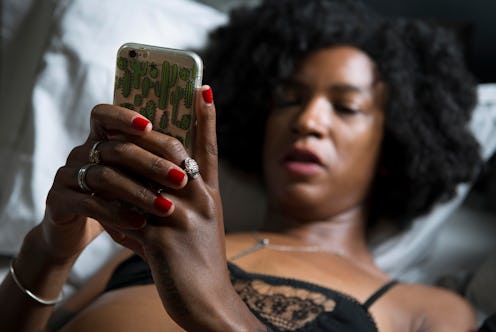Life
Here's What You Should Know If You're Using A Period Tracker To Prevent Pregnancy

Many people who are trying to get pregnant use period-tracking apps to figure out when they're most fertile. But does it work the other way around? Can your period tracker act as birth control?
For those who don't know, most period-tracking apps have you record when you get your period, then they'll forecast when it's going to come next, along with related predictions like how fertile you are and whether you might experience any PMS symptoms. With this wealth of information, you might be curious if you could also use your app's data to avoid pregnancy.
Using a period-tracker to help prevent pregnancy relies on the rhythm method — having sex during the times in your cycle when you're the least fertile. But one problem with this method in general is that it's hard to know where exactly your fertility is, Austin, Texas-based reproductive physician Dr. Kaylen Silverberg tells Bustle. Most menstrual cycles are somewhat irregular — that is, they're not the same length every time. That's why, if you've used a period-tracking app, you might notice that your period doesn't actually come on the day it says it will. It might come a few days earlier or later, and that's normal.
What further complicates things is that even if you get your period at the same time every month, you may not ovulate at the same time every month. And when it comes to preventing pregnancy, that's the event that's important, since it's the time of month when you'll want to avoid unprotected sex.
"You would have to be abstinent for 7-10 days in the cycle to prevent pregnancy when you ovulate, but it's not known when you are ovulating," OB/GYN Fares Diarbakerli, M.D. tells Bustle.
So, it's not too surprising that that rhythm method has a 24 percent failure rate. In other words, for every 100 people who use it in a year, 24 will get pregnant. One anonymous 39-year-old woman tells Bustle she was one of these people. Since her app said she was nowhere near ovulation, she had unprotected sex on vacation. When she got home, she found out she was pregnant.
"I'm thrilled that I relied on the app — when I shouldn't have — because my son is awesome, and I was well prepared at that point to become a single mom," she said. "But, I'd never, ever, ever recommend someone rely on it to avoid pregnancy! I got an IUD immediately after my son was born. Now THAT'S the way to go."
While using the rhythm method with the help of a period-tracker won't singlehandedly serve as effective birth control, it can decrease your chances of getting pregnant in combination with other methods. Since no form of birth control is perfect, avoiding sex during your most fertile times of month can be an additional measure to play it safe. To get as much help as you can from a period tracker, you should enter as much data as possible, Andrew Kovzel, CTO of period-tracking app Flo, tells Bustle.
Some period-tracking apps also have features that can help you get the most out of other birth control methods. Clue, for example, has a smart pill tracking feature, which will tell you when to avoid sex (or use another method) after you miss a pill or take it at the wrong time.
So, if you have a period-tracking app and are having sex, using an extra birth control method like condoms during your most fertile time is a great addition to another form of birth control. So is using your app to learn how your birth control is affecting you. But unless you're OK with having a one-in-four shot of getting pregnant within a year, it's best not to rely on it.